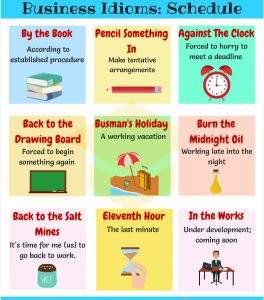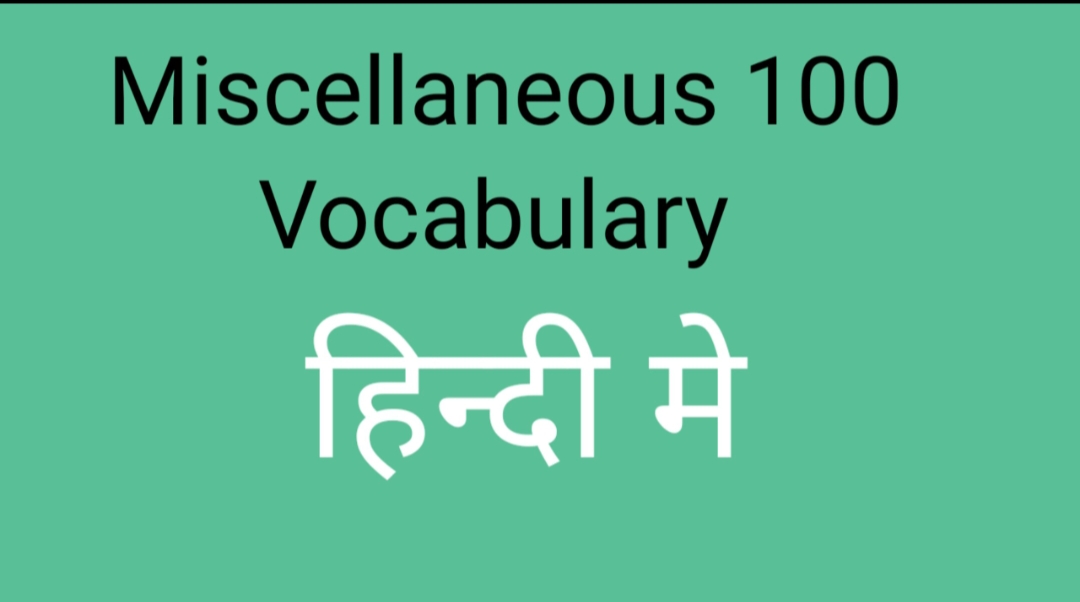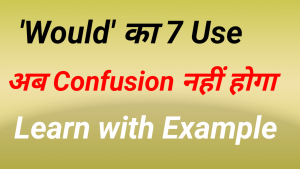100100 vocabulary that are mostly used by English speaking people. It will enrich your power of speaking to the next level of English. One must know use of Tenses and important modal Verbs along with word meaning and useful sentences in order to speak English well.
100 Vocabulary with their Hindi meaning
1. Measure Words vocabulary:
1. A loaf of bread – एक पावरोटी
2. A piece of paper – पेपर का एक टुकड़ा
3. A slice of pizza – pizza का एक हिस्सा
4. A bolt of lightening – बिजली की चमक
5. A deck of cards – ताश के पत्तों की गड्डी
6. A bunch of bananas – केले का गुच्छा
7. A tube of toothpaste – टूथपेस्ट की एक ट्यूब
8. A gallon of gasoline – गैसोलीन का एक गैलन
9. A kilo of sugar – एक किलो चीनी
10. A can of pepsi – पेप्सी का डिब्बा
11. A box of cereal – अनाज का डिब्बा
12. A bowl of soup – सूप का कटोरा
13. A tub of margarine – मक्खन का टब
14. A bar of soap – साबुन की टिकिया
15. A carton of milk – दूध का बक्सा
2. Some Types of Metals vocabulary:
1. Aluminum – अल्युमीनियम
2. Brass – पीतल
3. Bronze – कांसा/कांस्य
4. Chromium – एक सख्त सफ़ेद धातु जिसमें जंग नहीं लगती. यह stainless steel में काम आती है।
5. Copper – तांबा
6. Gold – सोना
7. Gunmetal – एक ऐसी धातु जिसमें जिंक होती है और जिसमें जंग नहीं लगती
8. Iron – लोहा
9. Lead – यह व्यापक रूप से कार बैटरी, गोला बारूद, केबल आवरण, विकिरण सुरक्षा और टाँका लगाने में प्रयोग किया जाता है।
10. Magnesium – एक सफ़ेद चांदी के रंग सी धातु जो flash bulb बनाने के काम आती है।
11. Mercury – पारद – एक चांदी के रंग सी तरल धातु जो थर्मामीटर में भरी होती है।
12. Platinum – एक सफेद रंग की जंग प्रतिरोधी धातु. इसके आभूषण बनाये जाते हैं।
13. Silver – चांदी
14. Tin – टिन की पन्नी. टिन के जंग को रोकने के लिए अन्य धातुओं की सतह पर एक coating के रूप में प्रयोग किया जाता है।
15. Titanium – एक ऐसी धातु जो हल्की होती है पर स्टील से मजबूत होती है और इसमें जंग प्रतिरोधी क्षमता होती है।
16. Uranium – एक प्रकार की धातु जो परमाणु हथियार बनाने के लिए प्रयोग में लिया जाता है।

3. Sentences of Daily Use and vocabulary:
1. बिस्तर बिछा दो – Make the bed please.
2. समान खोल दो – Unpack the luggage.
3. सुई में धागा डाल दो – Thread the needle.
4. नाक साफ कर लो – Blow out the candle.
5. जाओ मजे करो – Go and enjoy yourself.
6. अपने जूते उतार लो – Take off your shoes.
7. नींबू निचोड़ दो – Squeeze the lemon.
8. उसी टेलीफोन करो – Ring him up.
9. 5:00 बजे का अलार्म लगा दो – Set the alarm at five.
10. जेबकतरों से बचो – Beware of pick – pockets.
11. अपने काम से काम रखो – Mind your own business.
12. अपने नाखून काट लो – pare your nails.
13. पेंसिल से मत लिखो – Do not write with pencil.
14. नंगे पांव मत चलो – do not walk barefooted.
Sort English sentences
1. Tell me – मुझे बताओ।
2. That’s enough – काफ़ी है।
3. Don’t cry – रो मत ।
4. Enjoy yourself – मज़े करो।
5. Let me go – मुझे जाने दो।
6. Have patience – धैर्य रखो।
7. Shut the door – दरवाज़ा बंद करो।
8. Open the windows – खिड़कियां खोल दो।
9. Come with me – मेरे साथ आओ।
10. Switch on the fan – पंखा चालू करो।
11. It’s terribly hot – बहुत ज़्यादा गर्मी है।
12. That’s true – सच है।
13. He is asleep – वह सो रहा है।
14. I’m leaving – मै जा रहा हूं।
15. Not enough – काफ़ी नहीं है।
16. It’s obvious – ज़ाहिर सी बात है।
17. Sure! – ज़रुर ।
18. I’am tired – मैं थक गया हूं।
19. I know – मुझे पता है।
20. Let her speak – उसे बोलने दो।
21. Boil the eggs – अंडे ऊबाल दो।
22. Not again – दोबारा नहीं।
4. भारतीयों द्वारा की जाने वाली 9 सामान्य अंग्रेजी गलतियाँ:
1. Revert back: The word ‘revert’ means to return, go back, change back. We do not need to add ‘back’ again after it. Also, to ask someone to reply to you, use the words ‘reply/ respond/ response’ instead of revert. E.g. Look forward to a positive response. (‘Revert’ शब्द का अर्थ है वापस लौटना, वापस जाना, वापस बदलना। हमें इसके बाद फिर से ‘Revert’ जोड़ने की आवश्यकता नहीं है। इसके अलावा, किसी को आपसे उत्तर देने के लिए कहने के लिए, Revert के बजाय ‘Reply / Respond / Response’ जैसे शब्दों का उपयोग करें। E.g. Look forward to a positive response.)
2. Cousin brother/ Cousin sister: Just saying ‘cousin’ is enough, and correct. We do not need to add brother/ sister after ‘cousin’. For example: He is my cousin. (सिर्फ cousin कहना काफी और सही है. ‘Cousin’ के बाद brother या sister लगाने की ज़रूरत नहीं है. For example: He is my cousin.
3. Real brother/ Real sister: If you have the same parents, then refer to your siblings as ‘brother/ sister/ sibling’. For sons and daughters of uncles or aunts, call them ‘cousin’. (यदि आपके माता-पिता समान हैं, तो अपने भाई-बहनों को ‘brother/ sister/ sibling’ कहें। चाचा-चाची / मामा-मामी / भुआ-फूफा/मौसा-मौसी / ताया-ताई के बेटे-बेटियों को ‘Cousin’ कहा जाता है।
4. Fast friend: This is incorrect English. If someone is your very close friend, you can refer to that person as ‘a close friend’. (यह गलत अंग्रेज़ी है. अगर कोई आपका बहुत करीबी दोस्त है तो उसे ‘close friend’ कहें. n
5. Prepone: ‘Prepone’ is not a valid English word. Although, it is used so often that most Indians will understand it. (‘Prepone’ एक मान्य अंग्रेजी शब्द नहीं है। हालाँकि, यह इतनी बार उपयोग किया जाता है कि अधिकांश भारतीय इसे समझेंगे।)
6. More better: ‘Better’ is already the comparative form of ‘good’. We do not need to add ‘more’ before it. Good -> better -> best. (‘Better’ पहले से ही ‘good’ का तुलनात्मक रूप है। हमें इसके पहले ‘More’ जोड़ने की जरूरत नहीं है। Good -> better -> best.)
7. Introducing oneself using ‘Myself’: ‘Myself Amit’ is incorrect English. Use: ‘I am Amit’ or ‘My name is Amit’. (‘Myself Amit’ गलत अंग्रेजी है। या तो ‘I am Amit’ या ‘My name is Amit’ कहें।)
8. Forming plurals: The plural of ‘child’ is ‘children’. The words ‘childs’ and ‘childrens’ are incorrect. Similarly, ‘informations’ is incorrect, just say ‘information’.
Words like ‘Sister in law’ become ‘Sisters in law’ in the plural form, not ‘sister in laws’. (‘Child का बहुवचन रूप ‘Children’ होता है. ‘childrens’ गलत है. इसी तरह ‘informations’ गलत है, सिर्फ ‘information’ कहें. ‘Sister in law’ का बहुवचन ‘Sisters in law’ होता है. ‘Sister in laws’ गलत है.
9. Pass out: If you want to say that you finished school or college, use the word ‘graduated’ or ‘completed my degree’. ‘To pass out’ = to be unconscious or drunk. ‘I passed out of college’ is incorrect English. (अगर आप कहना चाहते हैं कि आपने अपना कॉलेज या स्कूल पूरा कर लिया है, तो ‘graduated’ या ‘completed my degree’ का इस्तेमाल करें. ‘To pass out’ का मतलब है बेहोश होना या ज्यादा पी लेना. ‘I passed out of college’ गलत अंग्रेज़ी है.
5 Body movements (Verbs: Body movement के प्रकार)
1. Climb – चढ़ना
2. Fall – गिरना
3. Kick – लात मारना
4. Throw – फेंकना
5. Catch – पकड़ लेना
6. Pick up – उठाना
7. Put down – नीचे रखना
8. Run – भागना
9. Crawl – घसीटते चलना
10. Pull – खींचना
11. Push – धक्का
12. Jog – धीरे-धीरे दौड़ना
13. Tiptoe – पाँव की अंगुली के बल चलना
14. March – तेज़ी से चलना
15. Bend – झुकना
16. Carry – उठाना
17. Drop – छोड़ देना
18. Lift – उठाना
19. Stretch – खींचना
20. Kneel – घुटनों के बल बैठना
21. Crouch – दुबक के बैठना
22. Hop – एक टांग पर कूदना
23. Skip – कूदना
24. Jump – छलांग
25. Slip – फिसलकर गिराना



